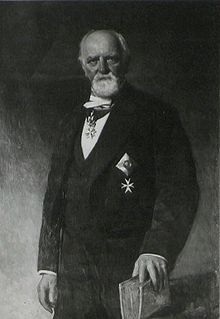Moritz von Blanckenburg
Moritz von Blanckenburg (born May 25, 1815 in Zimmerhausen , Regenwalde district ; † March 3, 1888 there ) was a large German landowner and member of parliament. In the years before and after the founding of the German Empire, he sat as a conservative in the Reichstag (1867–1873).
family
Moritz von Blanckenburg came from the old Pomeranian noble family von Blanckenburg . He was the son of the large landowner Eduard von Blanckenburg (1789–1872) and Emma von Frankenberg and Proschlitz (1793–1838), and the grandson of Henning Dionysius Ludwig von Blanckenburg (1764–1813) and Friederike von Zastrow . Henning von Blanckenburg had acquired the Allodial - Rittergut Zimmerhausen in the Regenwalde district in 1801 .
Blanckenburg was initially married to Bismarck's good friend , Marie von Thadden-Trieglaff (* 1822; † 1846), daughter of the conservative Prussian politician and landowner Adolf von Thadden-Trieglaff (* 1796; † 1882), but left after her early death in 1853 a second marriage with Therese von Below -reddentin (* 1822, † 1892).
His daughter Magdalena von Blanckenburg married Waldemar von Roon in 1864 , the son of the Prussian field marshal and minister Albrecht von Roon . Moritz von Blanckenburg was a childhood friend of Otto von Bismarck's ("Conversion Letter 1843").
Life
Blanckenburg attended the Berlinisches Gymnasium zum Grauen Kloster and studied law and political science at the Friedrich-Wilhelms-Universität zu Berlin . In 1838 he was one of the founders of the Corps Neoborussia Berlin . After working at the court in Stettin and at the higher court in Berlin , he resigned from the civil service in 1843 to take over the administration of his father's property.
In addition, he was often active on the municipal parliaments and the provincial parliaments. In 1851 he became a member of the Second Chamber of the Prussian House of Representatives . In 1861 he was a co-founder of the Prussian People's Association , from 1862 its chairman. In the Reichstag election in February 1867 and the Reichstag election in August 1867 , he was elected to the Reichstag (North German Confederation) for the constituency of Stettin 6 ( Naugard , Regenwalde ) . As soon as he entered parliamentary life, he joined the extreme right (then the Gerlach faction ), and he remained loyal to this party in all phases of Prussia's development. Gradually he became their parliamentary leader. In the Reichstag election in 1871 , he entered the Reichstag (German Empire) .
When Otto von Bismarck began the fight against the Roman Catholic hierarchy after the war in 1870/71 , approached the liberals and presented the laws on school supervision , civil marriage, etc., Moritz von Blanckenburg withdrew from political life completely, as he had this turn of the could not approve of his long-time friend, the Chancellor.
From 1883 to 1888 he was general landscape director of the Pomeranian landscape . In 1885 he received the title of Real Privy Councilor . Moritz von Blanckenburg and his wife Marie von Thadden-Trieglaff belonged to the circle of Pomeranian Pietists ("Grünhoff community") around Hans Hugo von Kleist-Retzow .
See also
- List of corps students in the Prussian House of Representatives
- List of Corps students in the Reichstag of the North German Confederation and in the Customs Parliament
- List of corps students in the Reichstag of the German Empire
literature
- Hans-Joachim Schoeps : Blankenburg, Henning Karl Moritz von. In: New German Biography (NDB). Volume 2, Duncker & Humblot, Berlin 1955, ISBN 3-428-00183-4 , p. 285 f. ( Digitized version ).
- Hans Goldschmidt: Moritz von Blanckenburg (1815-1888). A contribution to the history of Pomeranian conservatism. In: Blätter zur deutschen Landesgeschichte 91, 1954, pp. 159–181.
Web links
- von Blanckenburg, Moritz Carl Henning in the database of members of the Reichstag
- Biography of Moritz von Blanckenburg . In: Heinrich Best : database of the members of the Reichstag of the Empire 1867/71 to 1918 (Biorab - Kaiserreich)
Individual evidence
- ↑ Herbert v. Bismarck (ed.): Prince Bismarck's letters to his bride and wife . 5th edition. Stuttgart 1916, p. 278 .
- ↑ Kösener corps lists 1910, 12, 6
- ↑ Prussian House of Representatives 1849/67 (Institute for German Aristocracy Research)
- ^ Fritz Specht, Paul Schwabe: The Reichstag elections from 1867 to 1903. Statistics of the Reichstag elections together with the programs of the parties and a list of the elected representatives. 2nd Edition. Carl Heymann Verlag, Berlin 1904, p. 49; see. also A. Phillips (Ed.): The Reichstag elections from 1867 to 1883. Statistics of the elections for the constituent and North German Reichstag, for the customs parliament, as well as for the first five legislative periods of the German Reichstag . Louis Gerschel publishing house, Berlin 1883, p. 31.
- ↑ Bernd Haunfelder , Klaus Erich Pollmann : Reichstag of the North German Confederation 1867-1870. Historical photographs and biographical handbook (= photo documents on the history of parliamentarism and political parties. Volume 2). Droste, Düsseldorf 1989, ISBN 3-7700-5151-3 , photo p. 73, short biography p. 379-380.
- ↑ Gerhard Ziemer: The "Pomeranian Landscape". In: Baltic Studies . New Series, Volume 51, 1965, ISSN 0067-3099 , pp. 77-98.
| personal data | |
|---|---|
| SURNAME | Blanckenburg, Moritz von |
| ALTERNATIVE NAMES | Blanckenburg, Moritz Karl Henning von (full name) |
| BRIEF DESCRIPTION | German politician, MdR |
| DATE OF BIRTH | May 25, 1815 |
| PLACE OF BIRTH | Zimmerhausen , Regenwalde district |
| DATE OF DEATH | March 3, 1888 |
| Place of death | Zimmerhausen , Regenwalde district |

